
The Bottom Line
Introduction & Drive Details
After having reviewed Kingston's KC3000 2TB and finding it to be the fastest Phison E18 powered SSD ever made, we jumped at the chance to review the 1TB model. To us, the 1TB model is probably the most appealing in the lineup because it has enough capacity for our liking, is reasonably priced, and more than any other factor, it is single-sided. Single-sided SSDs are more desirable than double-sided because they draw less power, are easier to cool, and can potentially fit where double-sided SSDs cannot.
Even though the 2TB model is rated for 1,000 MB/s more sequential write it's not faster than the 1TB model, as we will demonstrate. For the most part, write throughput is a minimal factor as a relevant performance consideration in the consumer space. As mentioned, the KC3000 has proven to be the fastest Phison powered SSD ever made. So, what makes the KC3000 special? After all, there are plenty of other E18 powered SSDs arrayed with Micron 176L B47R Fortis grade flash out there. What sets the KC3000 apart from the rest is that so far only Kingston is running its flash at 1,600 MT/s while the rest are running at 1,200 MT/s.
1600 MT/s flash doesn't increase sequential eye candy. Instead, the increase comes from performance where it matters most, random read. Sequential speeds don't make your PC fast, lower latency does, and that's exactly what 1600 MT/s flash delivers. So even though other E18 powered SSDs may show similar or even higher advertised sequential speeds, they are not quite as fast as Kingston's consumer performance flagship.
As we always do with B47R arrayed E18 drives, we like to begin by demonstrating the drive's maximum sequential throughput, which is attained by running it on our AMD X570 test bench:
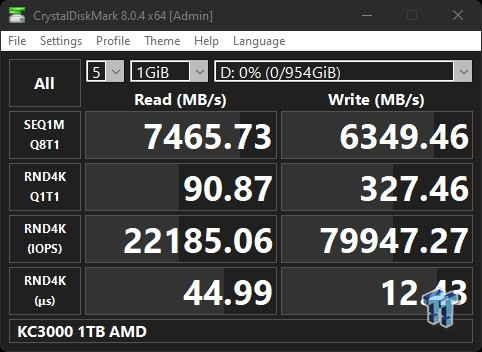
7,460 MB/s is about the max throughput that can be achieved over PCIe Gen4 x4. 7,400 MB/s is considerably more than Kingston's conservative factory throughput spec of 7,000 MB/s. Kingston likely spec'd the KC3000 with Intel systems in mind. Intel PCIe Gen4/Gen5 systems may not have quite as much sequential throughput on tap as AMD does, but as we mentioned previously, sequential throughput has very little to do with how fast an SSD is. Latency matters most, and Intel-based systems are far better than AMD in the latency department, which is why we use Intel for testing SSDs.
Drive Details
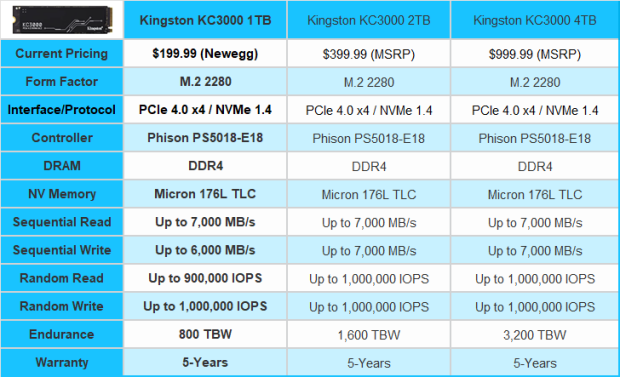
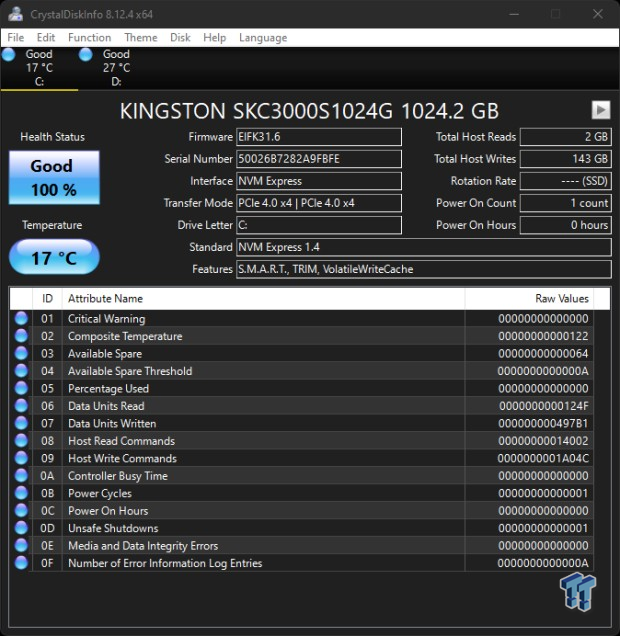
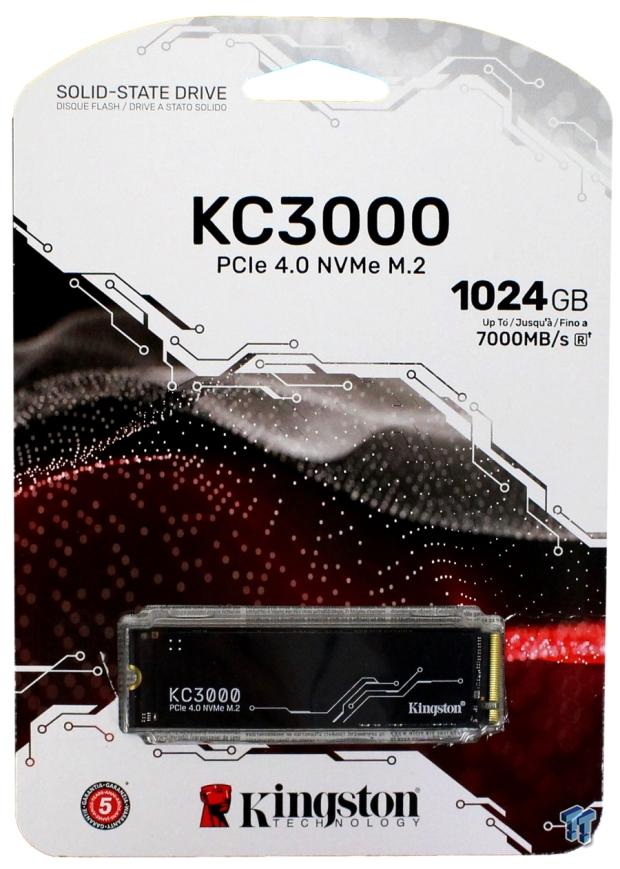
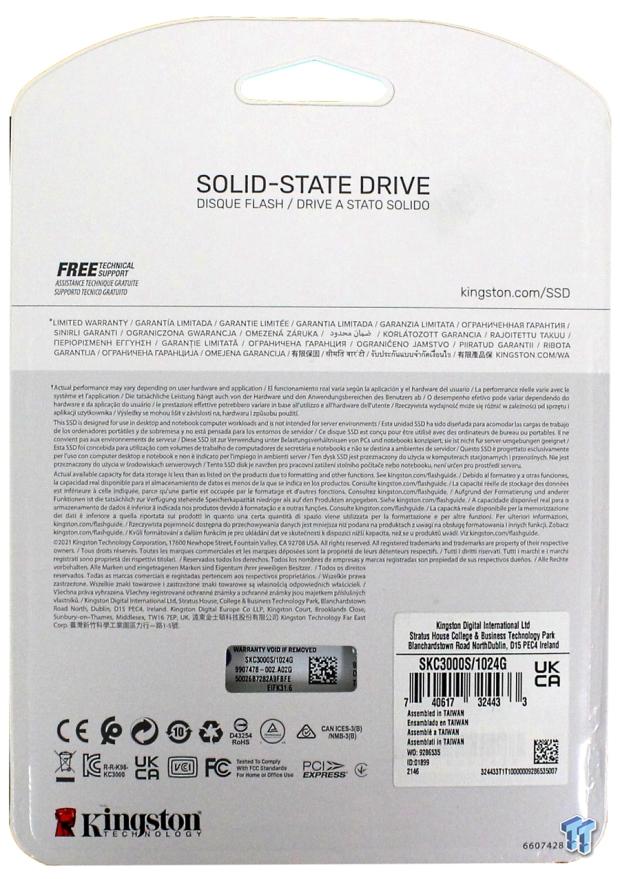


The KC3000 comes pre-fit with a rather effective graphene-coated aluminum thermal label. It's more effective than most other variants out there because it's at least twice as thick as others we've seen.
Kingston provides a key for Acronis True Image HD for cloning over your old data, and the company's website has an SSD toolbox for download. Click the link to download Kingston's SSD Manager.
Jon's Test System Specifications
- Motherboard: ASUS ROG Z690 HERO
- CPU: Intel Core i9-12900K
- Cooler: Alphacool Eissturm Hurricane Copper 45 - Buy from Amazon
- RAM: TeamGroup T-Force Delta DDR5 6400MHz 32GB - Buy from Amazon
- Video Card: Zotac 2080Ti AMP Edition - Buy from Amazon
- Case: PrimoChill's Praxis Wetbench - Buy from Amazon
- Power Supply: Thermaltake Toughpower GF1 1000W 80+ Gold - Buy from Amazon
- OS: Microsoft Windows 11 Pro 64-bit - Buy from Amazon
- Console: Sony PlayStation 5 - Buy from Amazon
- Console Heatsink: Sabrent Heatsink for PS5 Console - Buy from Amazon

Sony PlayStation 5 - M.2 Storage Expansion
PS5 Read Performance
With Sony's wildly popular PlayStation 5 console now enabled for M.2 NVMe SSDs to be used as fast storage expansion, we are including results for PS5 compatible SSDs we test as a part of our reviews going forward. We are using the newest PS5 hardware and software versions.
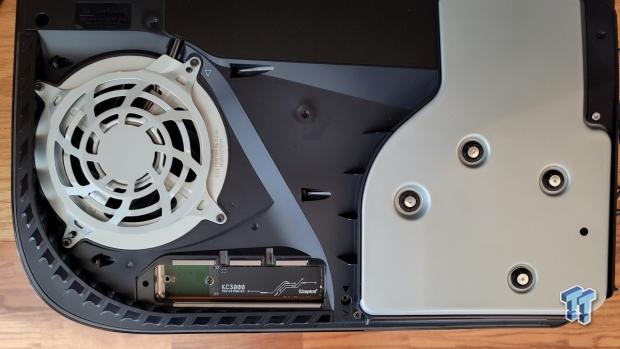
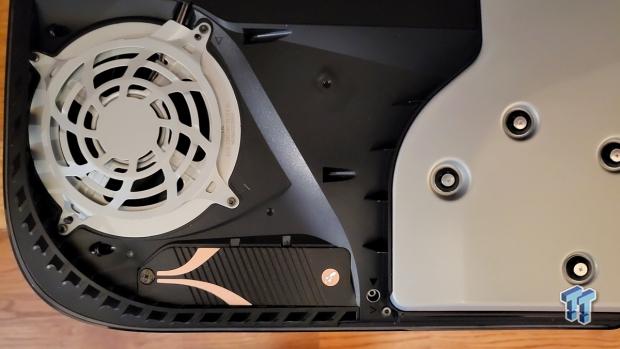
For SSDs like the KC3000 that don't have an adequately sized PS5 compatible heat sink or other SSDs where the heat sink provided doesn't fit and can be removed, we both use and recommend Sabrent's unparalleled PS5 heat sink available here.
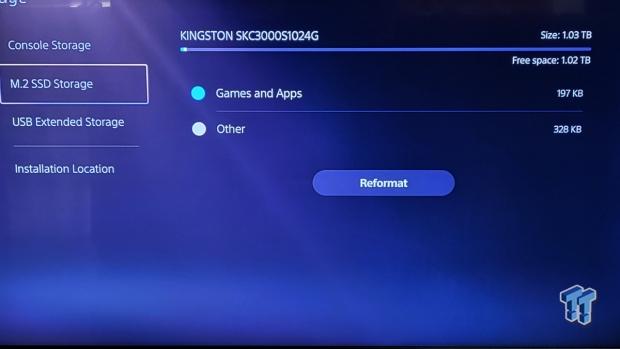
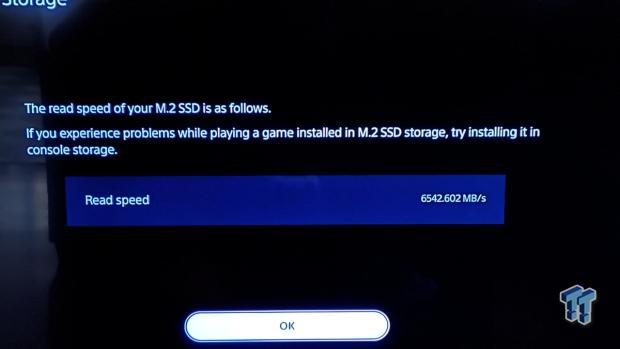
The newest PS5 hardware and or firmware has ushered in somewhat slower read speeds than we saw back in September of 2021 when Sony first enabled the PS5's storage expansion slot. This is likely part of a concerted effort to reduce fan noise caused by excessive heat generation.
For our PS5 chart, we only show SSDs that can deliver a minimum of 5,500 MB/s read, which is Sony's original recommendation. We note that with the latest PS5 software update, even SSDs that only do 4,200 MB/s no longer trigger a low-performance warning; nevertheless, we are sticking by Sony's original recommendation of 5,500 MB/s minimum read requirement.
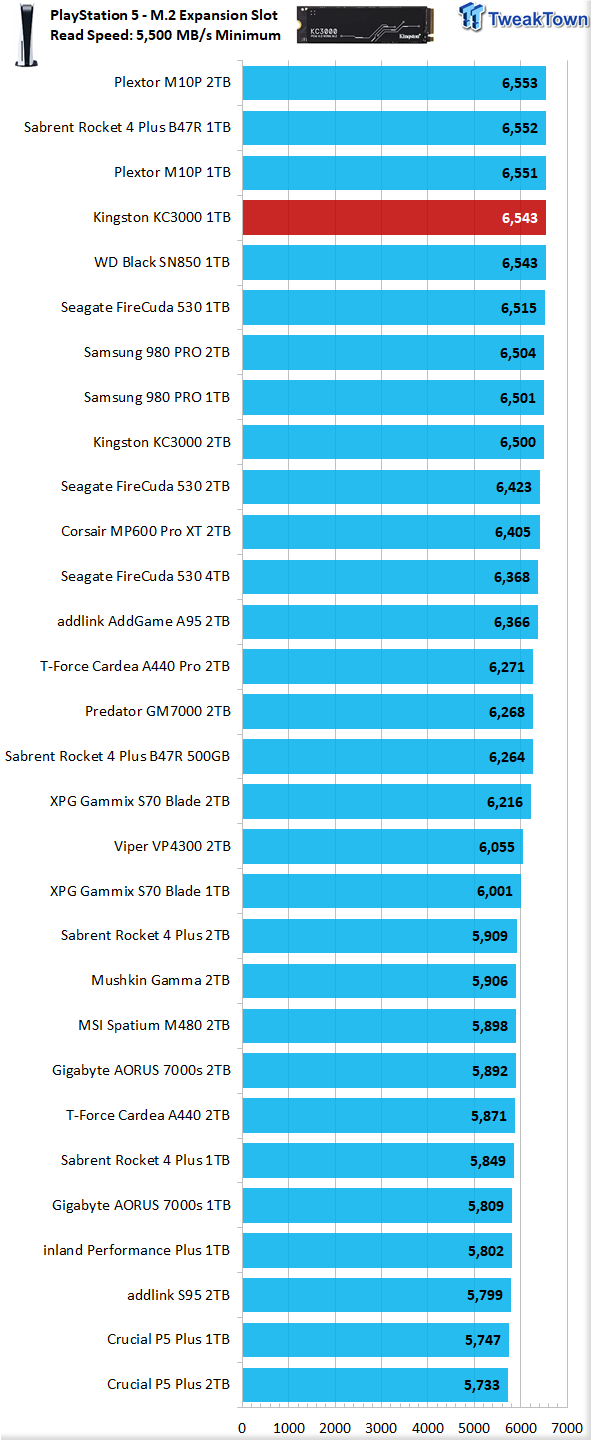
Certain SSDs have suffered a read speed hit with the latest PS5 software update, but the 1TB KC3000 is not affected as its PS5 read performance is as high as we've seen at any time for any SSD.
Synthetic Benchmarks: CDM, Anvil, ATTO
CrystalDiskMark
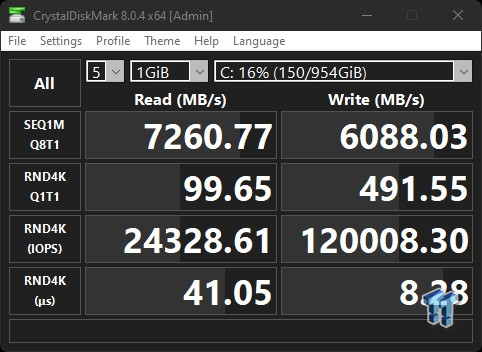
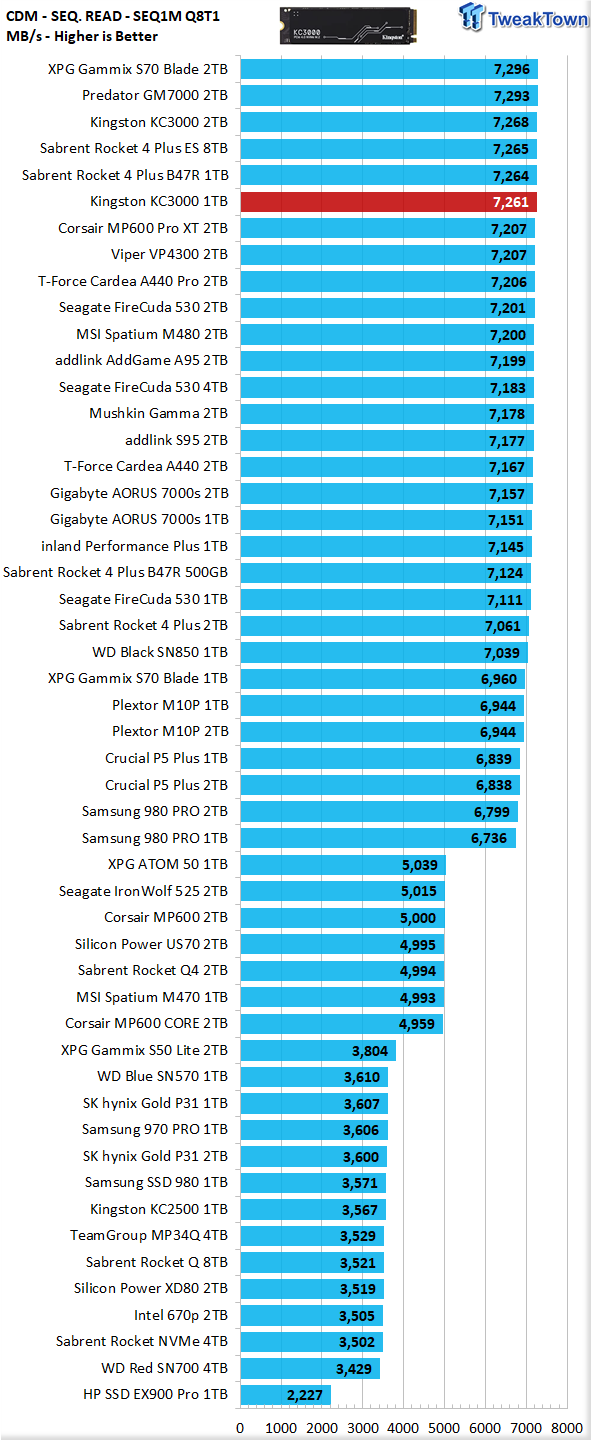
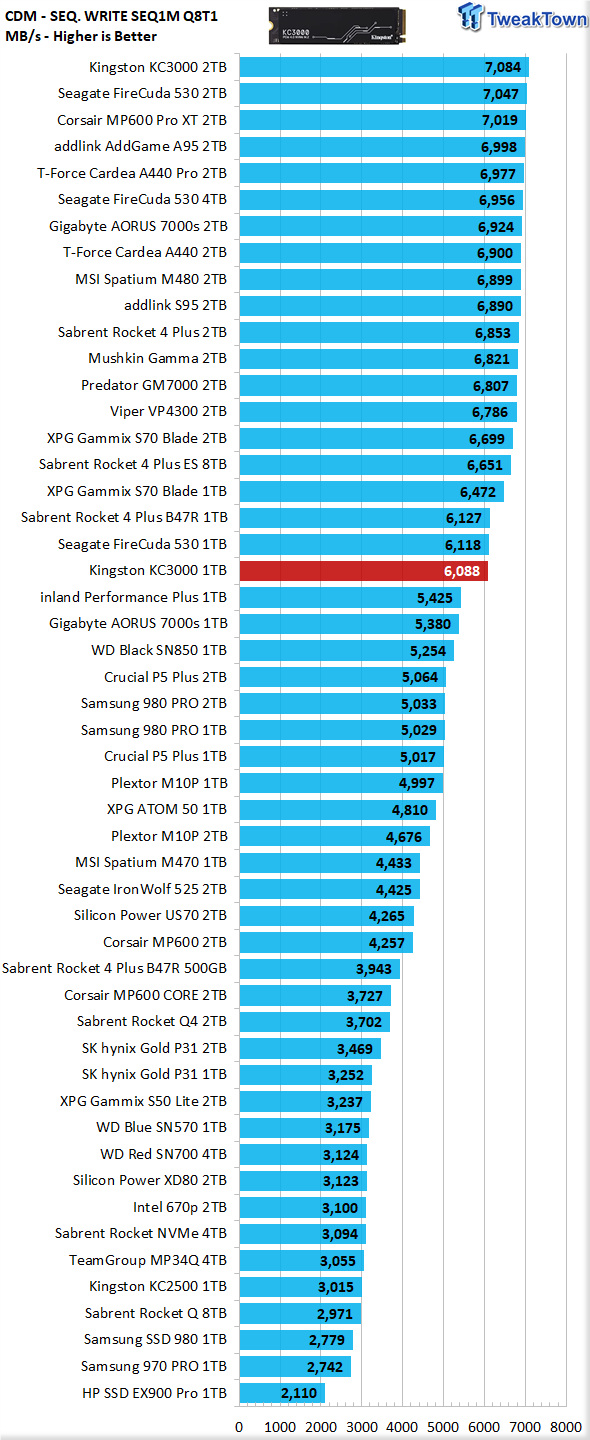
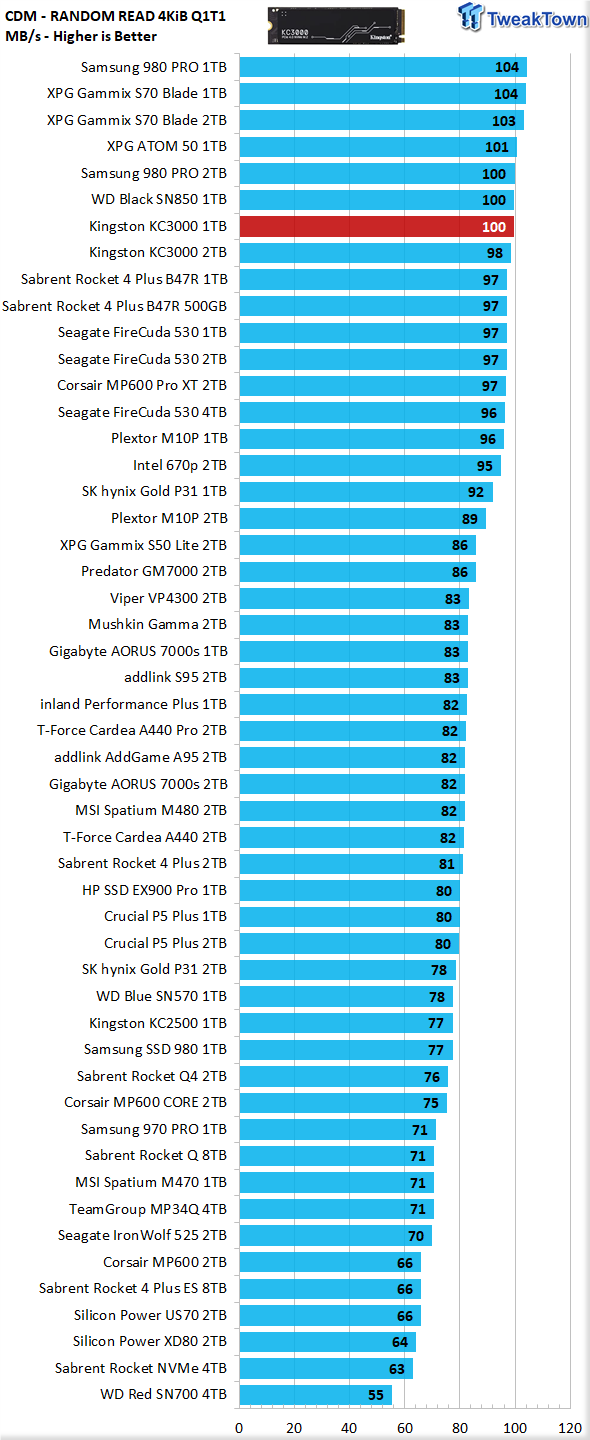
Let's start with the most impressive performance metric of this CDM run. 4K Q1T1 random read. This is significant because it's essentially 100MB/s, and as we see it, 100MB/s is a milestone for any flash-based SSD. It's better than the 2TB model gets, and only the seventh time we've seen a flash-based SSD be able to do it.
Everyone tends to focus on the big sequential numbers and even huge random write numbers like the 491 MB/s we are getting, but those numbers have almost nothing to do with how fast an SSD is in the consumer space.
Anvil's Storage Utilities
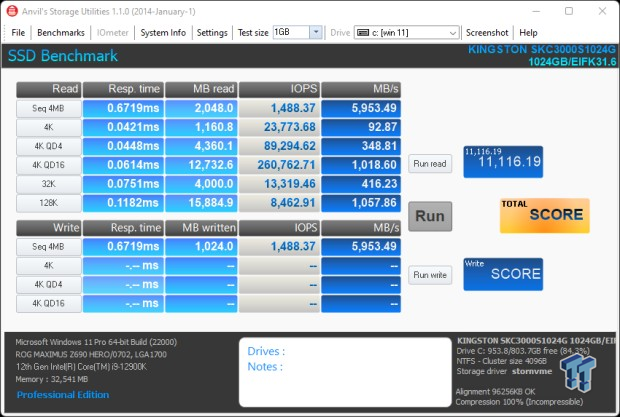
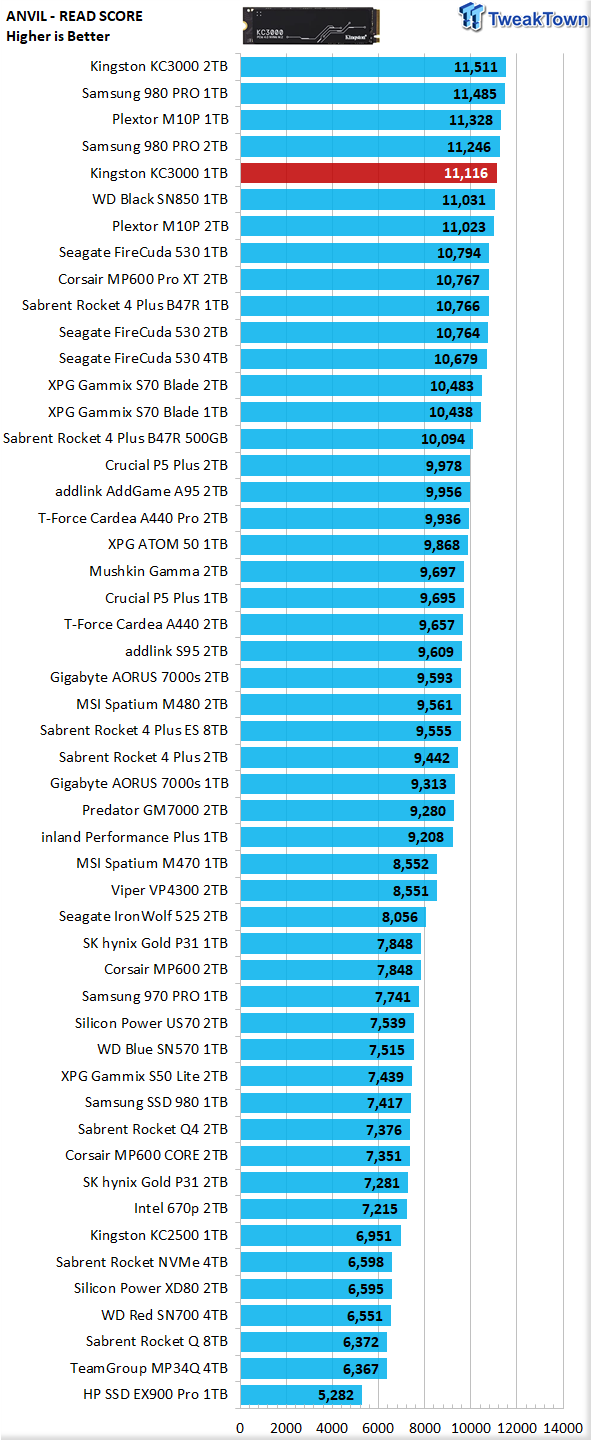
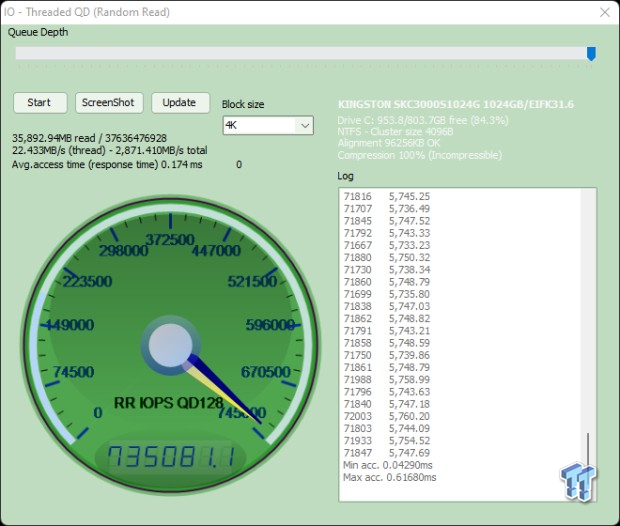
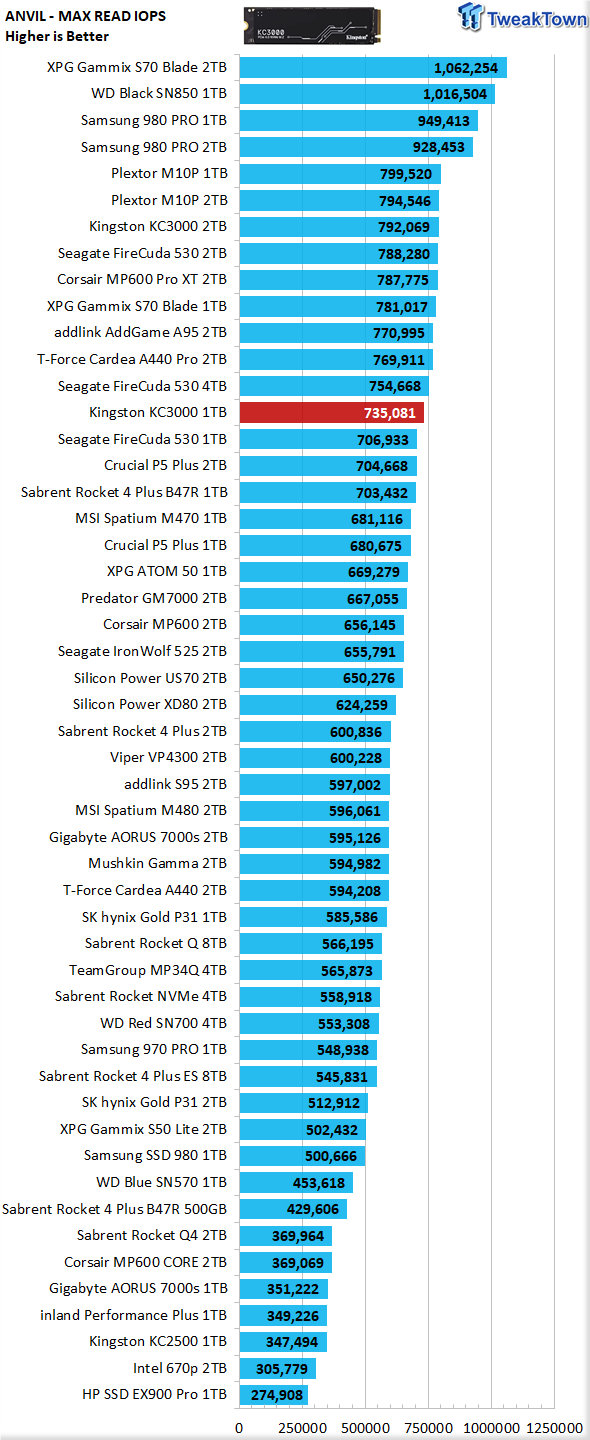
Here is a perfect example of why we say the KC3000 is the fastest Phison E18 controlled SSD. Out of all the E18 based SSDs we've tested, only the KC3000 can score 11K. Impressive. Looking at max IOPS, we can see the 1TB KC3000 delivering the most for any 1TB E18 controlled SSD.
ATTO
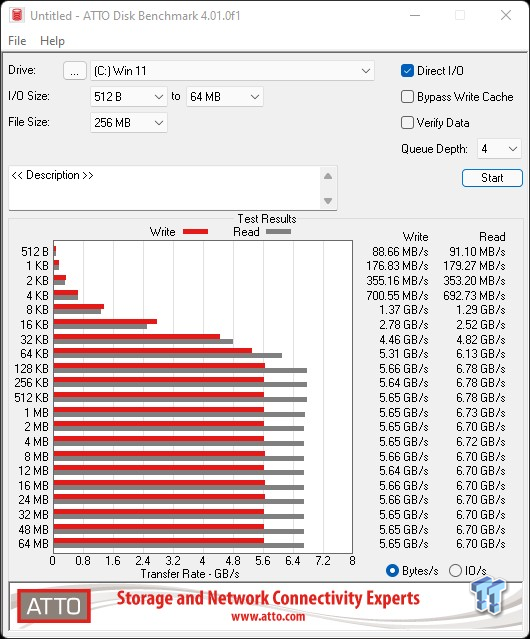
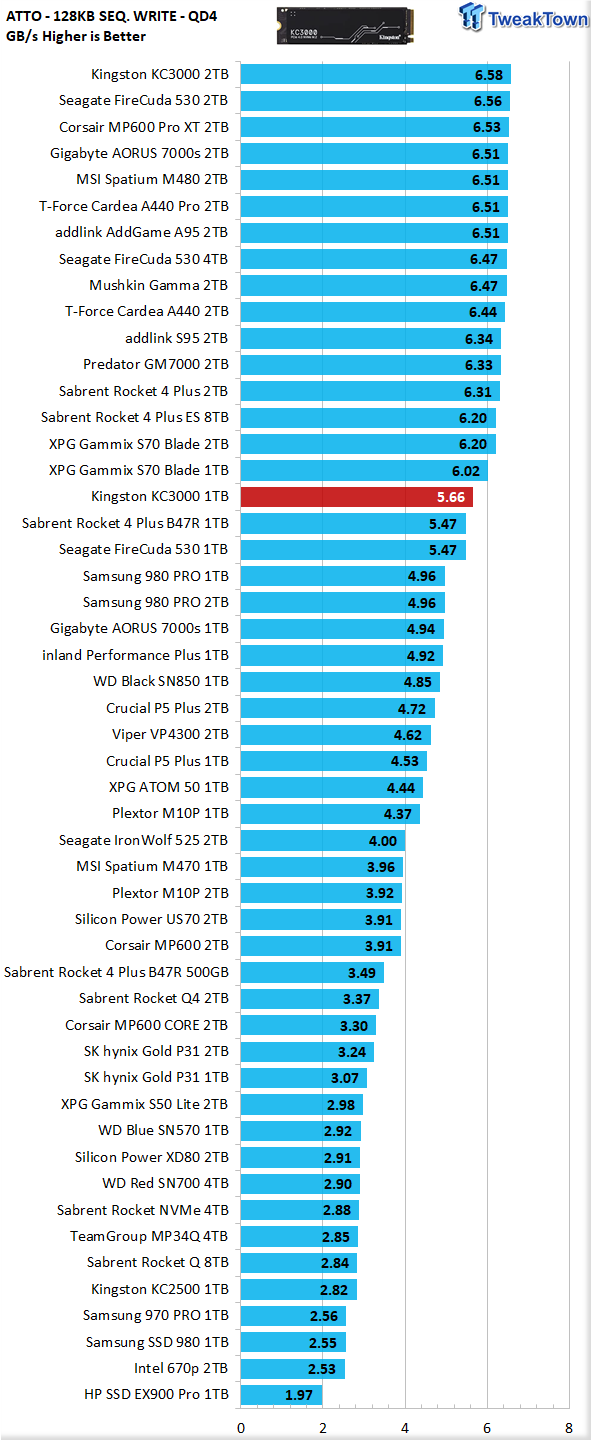
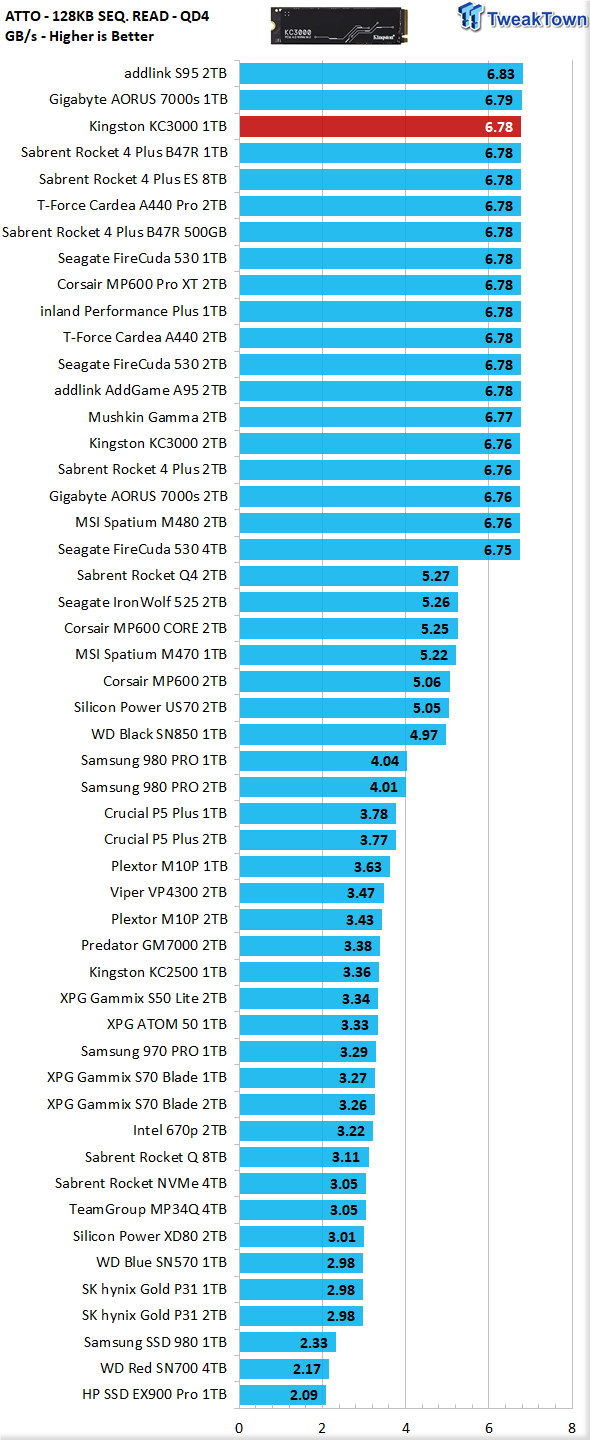
Again, the 1TB KC3000 demonstrates it is the fastest 1TB E18 powered SSD, this time, it is doing so with 128K sequential writes at QD4. On the read side of things, the 1TB KC3000 impresses again by tying for third-best ever.
Real-World Testing: Transfers, 3DMark SSD Gaming Test, PCM10 Storage
Transfer Rates
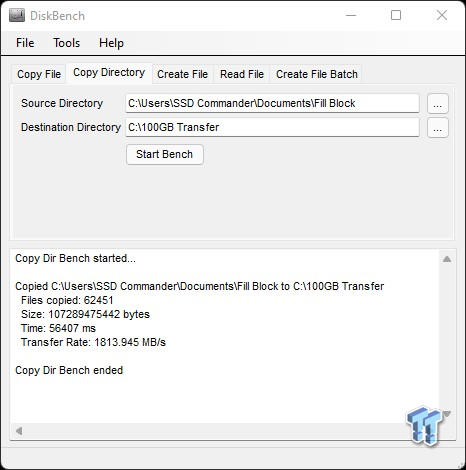
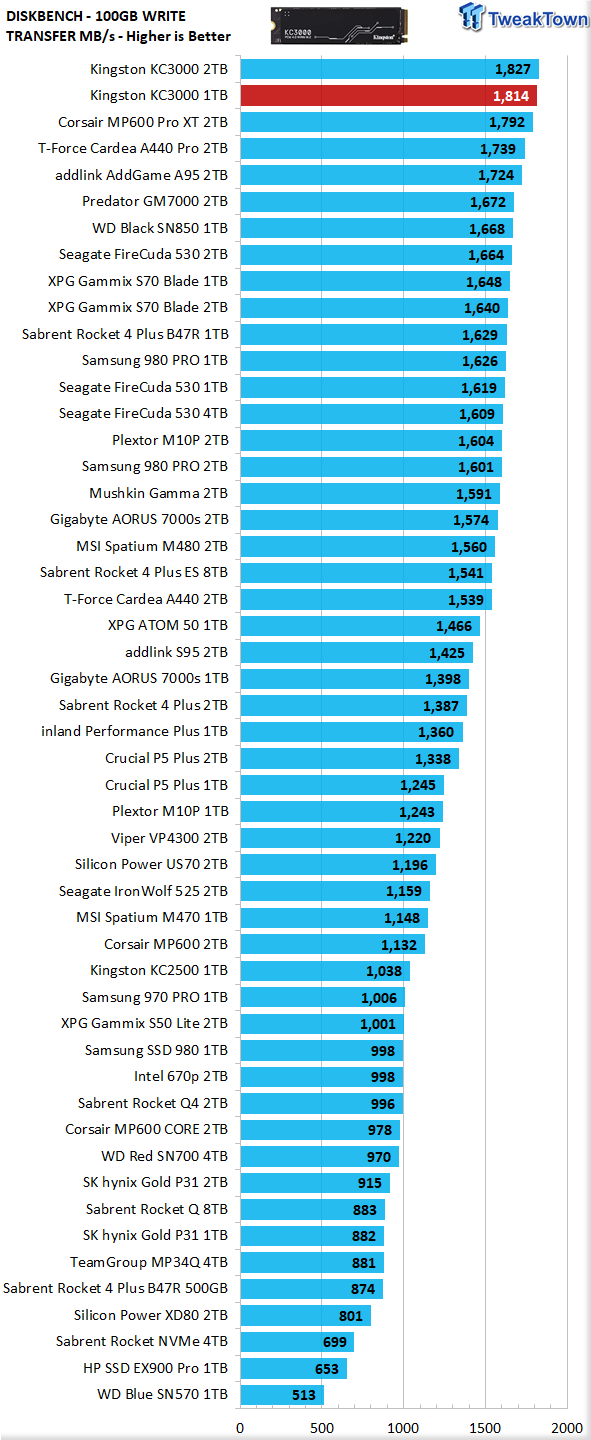
Impressive. The best result we've extracted from any 1TB SSD, second only to its higher capacity sibling.
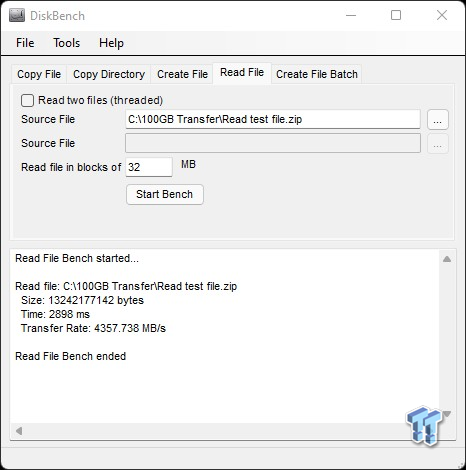
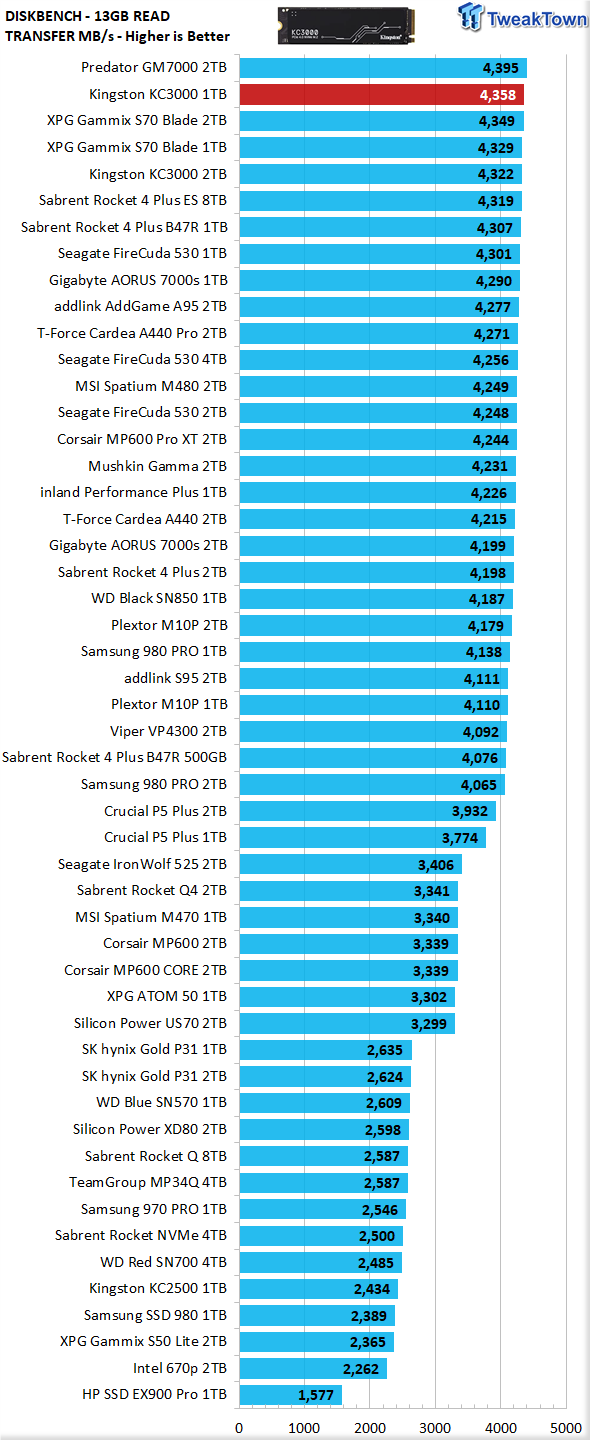
Even better and where it matters more. This time the 1TB KC3000 beats its 2TB sibling and turns in the second-best performance we've seen to date. Outstanding.
3DMark SSD Gaming Test
UL's newest 3DMark SSD Gaming Test is the most comprehensive SSD gaming test ever devised. We consider it superior to testing against games themselves because, as a trace, it is much more consistent than variations that will occur between runs on the actual game itself. This test is in fact the same as running the actual game, just without the inconsistencies inherent to application testing.
In short, we believe that this is the world's best way to test an SSDs gaming prowess and accurately compare it against competing SSDs. The 3DMark SSD Gaming Test measures and scores the following:
- Loading Battlefield V from launch to the main menu.
- Loading Call of Duty Black Ops 4 from launch to the main menu.
- Loading Overwatch from launch to the main menu.
- Recording a 1080p gameplay video at 60 FPS with OBS (Open Broadcaster Software) while playing Overwatch.
- Installing The Outer Worlds from the Epic Games Launcher.
- Saving game progress in The Outer Worlds.
- Copying the Steam folder for Counter-Strike Global Offensive from an external SSD to the system drive.
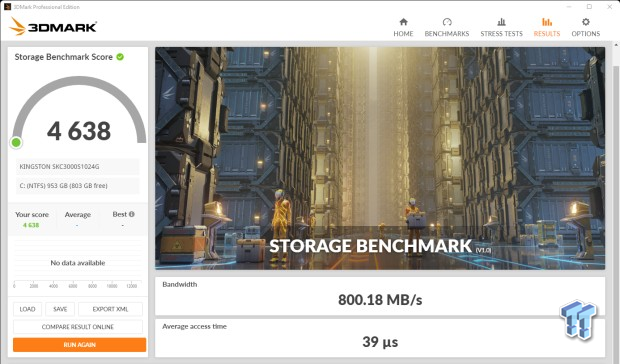
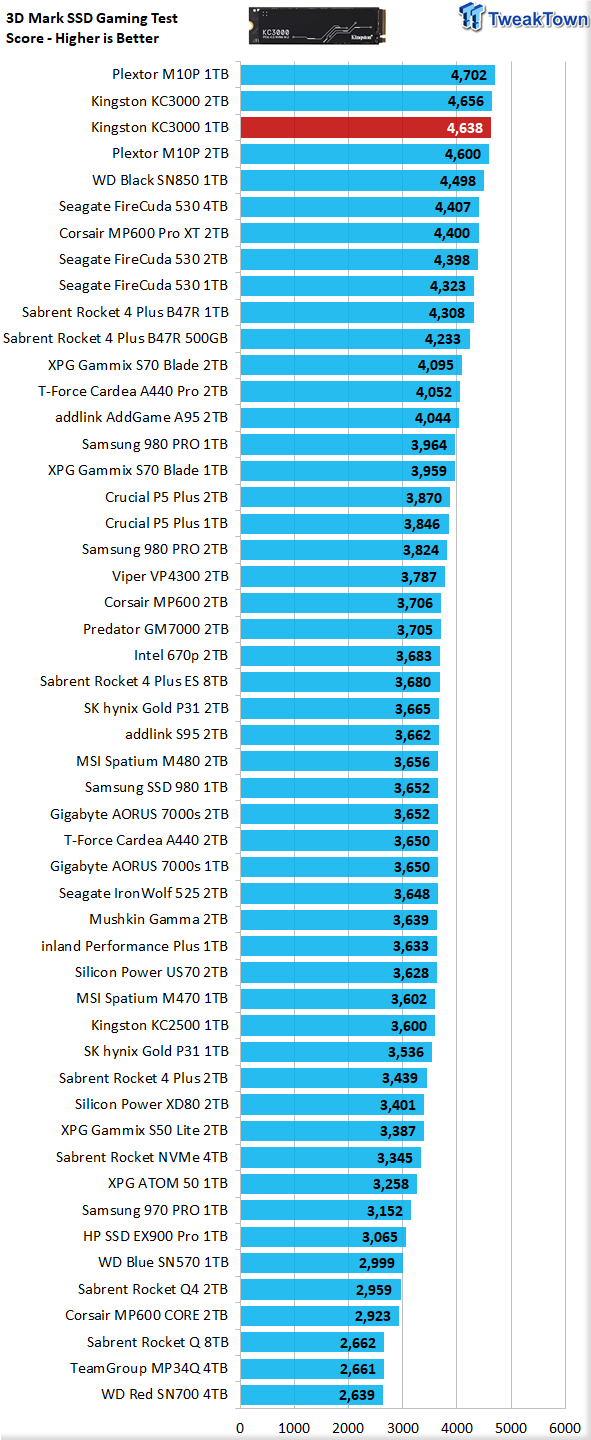
Gaming is a performance metric that matters to the majority of DIY consumers, especially to the enthusiast crowd that TweakTown caters to. As a gaming SSD, you simply cannot do better than Kingston's KC3000. The only flash-based drive that can best it in the gaming arena isn't available in the Americas.
PCM10 Storage Tests
PCMark 10 Storage Test is the most advanced and most accurate real-world consumer storage test ever made. There are four different tests you can choose from; we run two of them.
The Full System Drive Benchmark and the Quick System Drive Benchmark. The Full System Drive Benchmark writes 204 GB of data over the duration of the test. The Quick System Drive Benchmark writes 23 GB of data over the duration of the test. These tests directly correlate with mainstream user experience.
PCMark 10 Full System Drive Benchmark
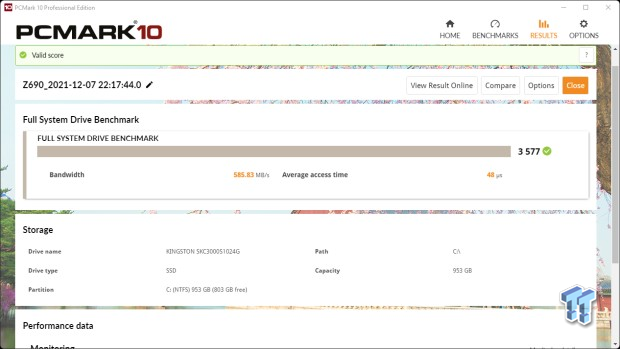
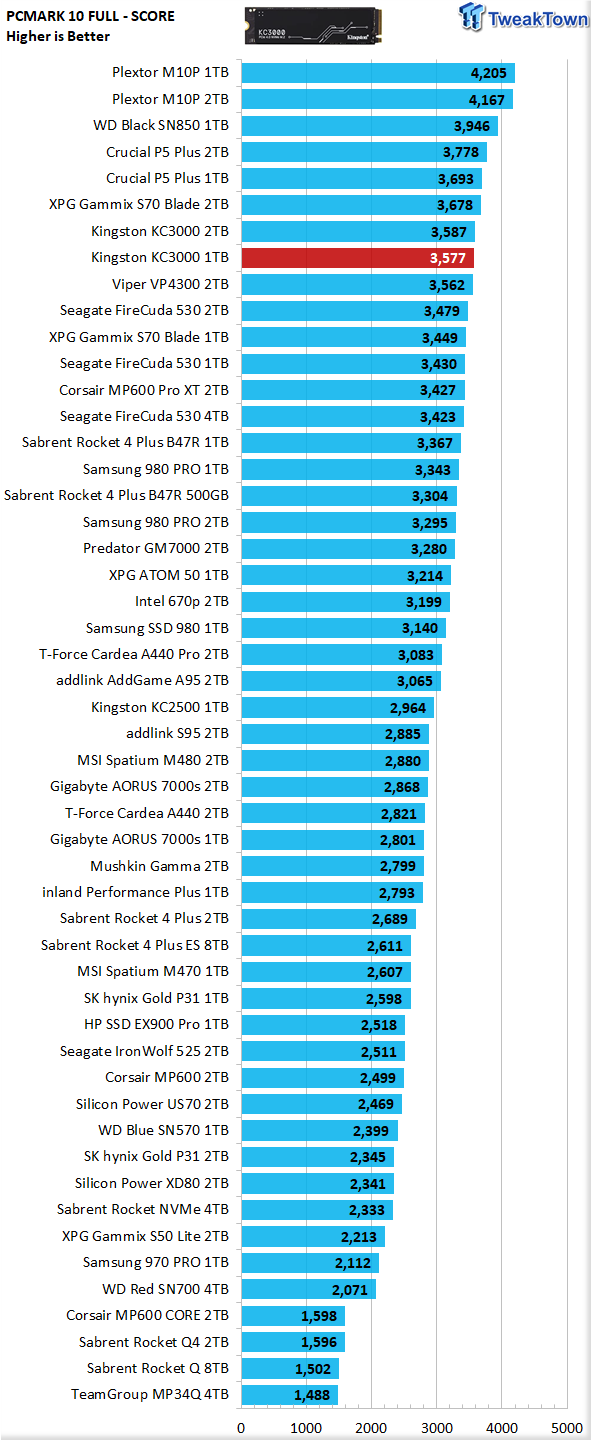
This particular test writes 204GB data and covers a broad range of common consumer tasks, including booting Windows 10, file transfers, Adobe and Office applications, and startup times for games including Battlefield V, COD Black Ops 4, and Overwatch. Unlike synthetic numbers, this is comprehensive real-world data which is why we use it to rank SSDs in terms of user experience.
We are looking for a minimum 500MB/s storage bandwidth along with 3000 points here. No problem for the KC3000 1TB. While not the fastest, because E18 SSDs simply are not the fastest here, the KC3000 again demonstrates that it is the fastest E18 SSD you can buy. Performance that matters.
PCMark 10 Quick System Drive Benchmark
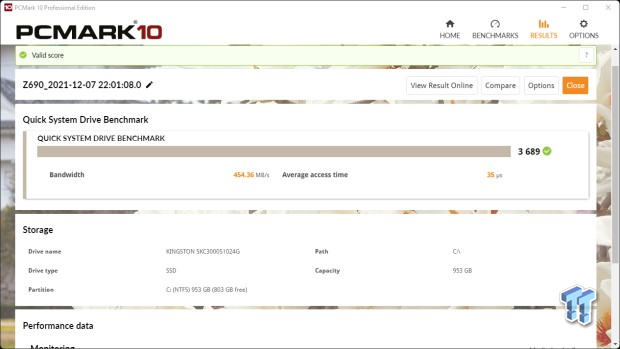
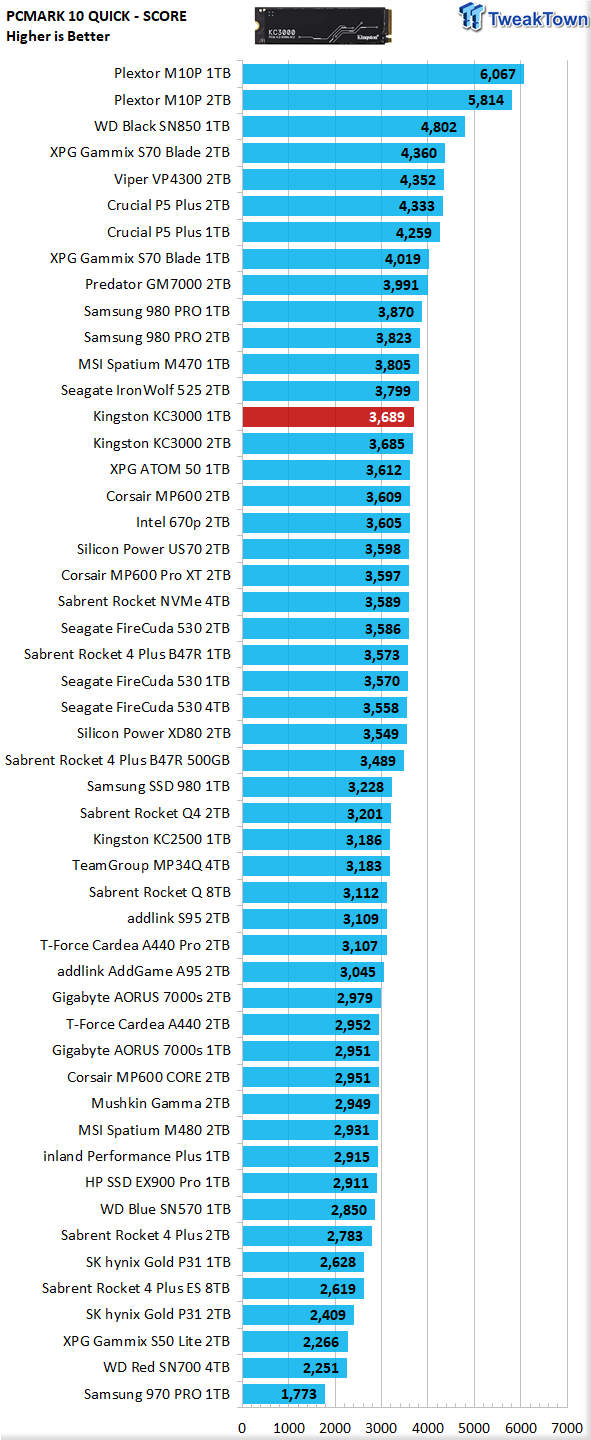
Although not a head-turning score, the 1TB KC3000 takes the win for the best E18 based SSD, even beating its larger sibling. Impressive.
Final Thoughts
Kingston is one of the few fabless memory companies that actually build its memory products. While most SSD retailers are selling canned Phison SSDs with customized labels or heat sinks or whatever it may be, they are all pretty much the same. Kingston is different, though. They build their own SSDs, package, and bin their flash. Kingston even customizes its own SSD firmware. This is the difference with the KC3000. It's not generic, it's custom-built by Kingston, and for the KC3000, Kingston chose the best 1,600 MT Micron B47R. This is the reason why the KC3000 is the fastest retail Phison based SSD to date and well worth the price of admission.
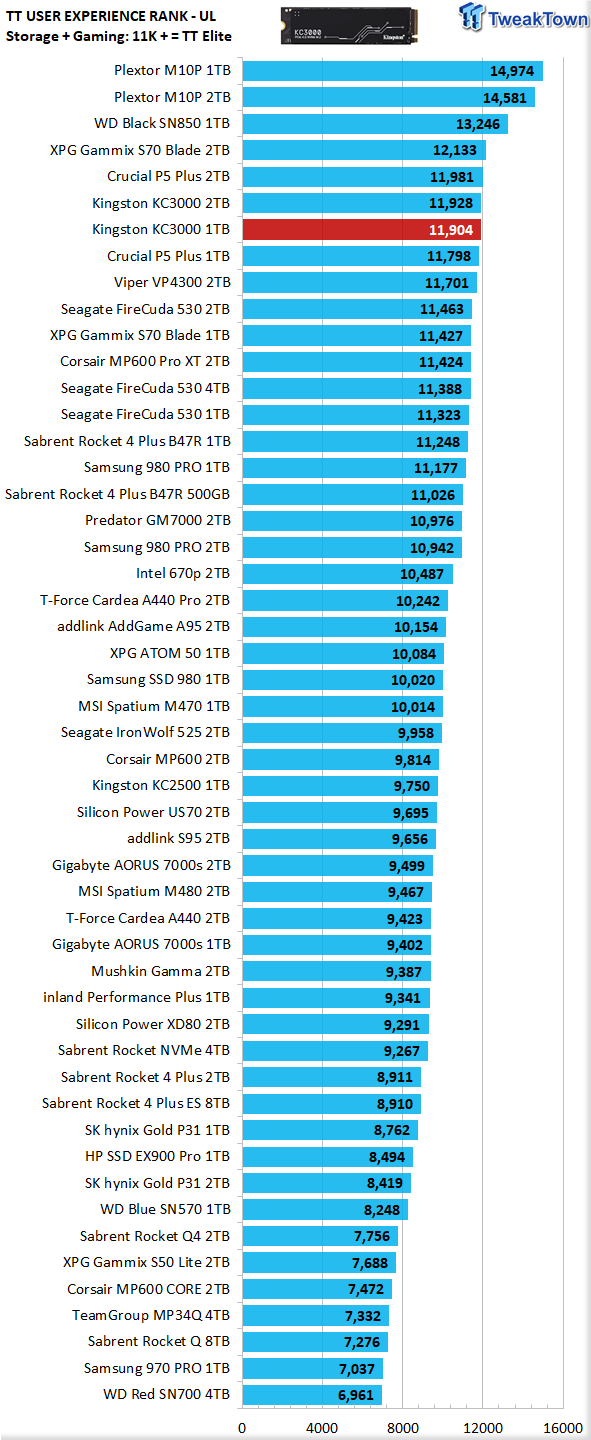
We rank SSDs in terms of overall user experience (performance where it matters most) as expressed by PCMark 10 storage and 3DMark gaming storage tests. We consider a user experience score of 11K or more to verify an SSD as a TweakTown Elite performer. Overall, the 1TB KC3000 delivers the 7th best TT User Experience score for any flash-based SSD we've tested, and we've tested them all. Impressive.
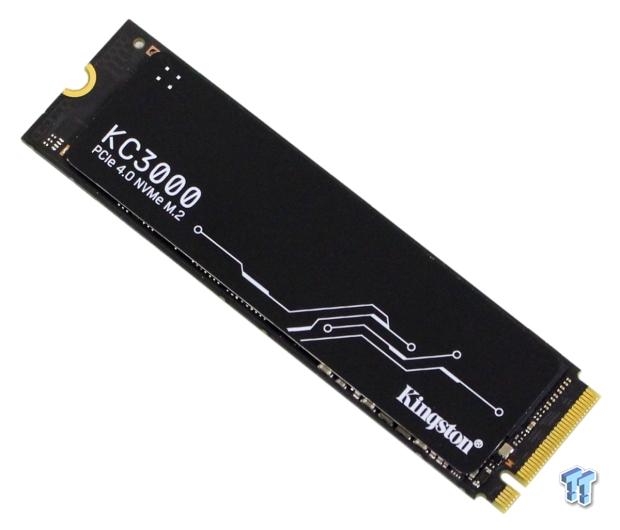
Workloads or gaming or whatever you may throw its way, the KC3000 is about as good as it gets. It's currently selling for $20 to $40 more than most other E18 SSDs arrayed with 176L B47R flash, but remember, it is faster. Additionally, there is something else that makes the KC3000 unique among its E18 brethren. The KC3000 is the only 1TB E18 SSD we know of that gives you 1024GB unformatted capacity. In other words, it is a true 1TB SSD. All others are 1000GB unformatted capacity. Kingston's KC3000 is a true speed demon, TweakTown Elite, and worthy of our highest award.
Pros
- Gaming
- PS5 Read Speed
- User Experience
Cons
- None

Performance |
99% |
Quality |
100% |
Features |
100% |
Value |
95% |
Overall |
99% |
Gaming juggernaut, certified TweakTown Elite, and ideal for PS5. You need this.

What's in Jon's PC?
- CPU: AMD Ryzen 7800X 3D
- MOTHERBOARD: GIGABYTE AORUS Master X670E
- RAM: Kingston Fury Renegade 7200MHz 32GB
- GPU: ZOTAC AMP Extreme GeForce RTX 4090
- SSD: Crucial T700 2TB Gen5
- OS: Windows 11 Pro
- COOLER: Lian Li Galahad 360 AIO
- CASE: Lian Li Lancool III
- KEYBOARD: Corsair K65 RGB Mini
- MOUSE: SteelSeries AEROX 5 Wireless
- MONITOR: ASUS ROG Strix PG27AQN 360Hz 1440p ULMB2
Similar Content
Related Tags

